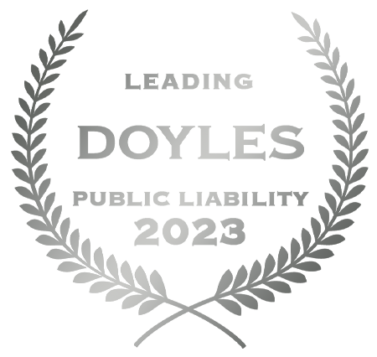
Psychological Injury in Victoria – WorkCover Claims Guide.
If you’ve suffered a psychological injury caused by work, you might not even realise that you’re able to make a WorkCover mental health claim to receive compensation and access support. It can feel scary to discuss with those closest to you, let alone a lawyer, but if you’re ever in this position, you’re not alone. You might be entitled to income support payments if you need to take time off work, payment of medical bills so that you don’t have to bear the financial burden of recovery, and even a lump sum compensation payment. Read on to find out if you’re eligible for a WorkCover claim for psychological injury in Victoria.

What’s the impact of a psychological injury?
The impact of a psychological injury can be wide-ranging, long-lasting and can often cause secondary issues. This means that if you’ve experienced PTSD then you may also develop anxiety or depression, which can make it harder to do things you normally do and may impact your physical health as well. It can lead to feelings of loneliness and isolation.
People often feel stigma around their mental health. Psychological injuries are often under-reported, which means that people aren’t accessing healthcare services that they’re entitled to.
Emergency service workers, carers, and those in mentally draining roles like teachers are all at higher risk of suffering a psychological injury. You can suffer a psychological injury in any profession, though, and the impacts can be severe. Having a psychological injury can cause loss of earnings, force you to take time off work or not be able to work at all, and can impact your relationships at work and at home.
If you’re seeking mental health compensation, WorkCover exists so that you can make a claim for financial support, and having a trusted WorkCover lawyer on your side will give you the best chance of making a successful claim.
Colin had to leave his profession as a teacher in 2018 after being subjected to severe bullying and intense pressure from a colleague. He didn’t even realise he was eligible to make a claim for his psychological injuries, but he was awarded $500,000. You can read Colin’s story here.
Call 13 15 15 or chat to us now for free advice
Chat nowFind out how much you can claim.
Get startedWhat do you need to make a WorkCover psychological injury claim in Victoria?
You might be asking does WorkCover cover mental health, and the answer is yes. WorkSafe Victoria is run by the state government and manages all claims for compensation for injuries that happened at work, and you’ll be making your claim to them. To make a WorkCover psychological injury claim you’ll need to know a few important steps, so we’ve created this list of advice that we give to all our clients about the process.
Step 1. Seek medical care
It can be hard to pinpoint the start of a psychological injury, but some signs that you might be experiencing one include:
- You’re getting flashbacks or intrusive thoughts about a particular event
- Increased feelings of sadness, tiredness, or numbness
- Heightened anxiety or stress when thinking about work
- Unusual anger and irritability
- Inability to ‘switch off’ from work
If you’re experiencing this, it’s really important to see your GP and discuss what you’re going through, and they can help you with a mental health care plan so that you can start receiving proper care. They may be able to recommend psychologists, help you manage symptoms, and begin recovering. Seeking treatment early can improve your long-term outcomes.
Step 2. Report the injury
Once you’ve started seeking treatment, you’ll need to let your workplace know about the injury so that you can make a WorkCover claim and start accessing financial support. Where possible, you should report it to your manager or HR department within 30 days of becoming aware of the injury, and then it’s the employer’s responsibility to alert their insurer. You’ll be asked to fill out a WorkCover claim form, which you should do truthfully and with as much detail as possible. This will allow you to start the process of making a claim.
Step 3. Gather and provide evidence
We always advise our clients to keep track of as much information as possible. Having a record of your symptoms, time you took off work, doctors you’ve seen, and any relevant communications you’ve had about the injury are all important pieces of information that will help you when you’re making your claim. It’s a good idea to write all of this down somewhere, and keep a record on your phone or computer. No detail is too small, and you never know when it might be useful.
You’ll need to provide evidence that the injury was caused by work, so it’s important to include any relevant information like if there were repeated incidences of bullying or harassment, or if your medical practitioner has made a statement specifying that work was the cause.
Step 4: Contact a WorkCover lawyer
Psychological injuries can be difficult to claim on WorkCover as you have to be able to prove that the injury was caused specifically by your job. If you’re claiming a lump sum, it’s important to have a specialised WorkCover lawyer on your side to help you through the process. A good lawyer will make sure you’re fully aware of the process and what you need to do to give yourself the best chance of making a successful psychological injury WorkCover claim.
At Law Partners, we’re experts in the WorkCover claims process, and we win over 99% of our cases. We understand that every situation is unique, and we’ve got experience with cases like yours. One of our specialist WorkCover claim lawyers will get to know you personally to fully understand the impact that your injury has had on your life, and help you access all of the compensation that you’re entitled to. If you’d like to know how we can help you, get in touch with us today for some personalised advice, completely free.
Can I make a claim if I have a pre-existing condition?
Yes, you can make a WorkCover psychological injury claim if you have a pre-existing condition. You’ll need to demonstrate that your work was a ‘significant contributing factor’ to the recurrence, aggravation, acceleration, exacerbation or deterioration of your pre-existing condition. WorkSafe will consider the impact of your work, the likelihood of the injury occurring anyway, and your lifestyle and activities outside of work.
Why would a WorkCover psychological injury claim be rejected in Victoria?
A WorkCover claim might be rejected for many reasons, but some of the most common include:
- The injury didn’t occur at work
- Your injury was caused wholly or predominately by management action that was taken on reasonable grounds, in a reasonable manner (such as a performance review, suspension, or restructuring of a role)
- You had a pre-existing condition that was not made substantially worse by work
If you think WorkSafe’s decision is unfair, you can dispute their decision with the help of a WorkCover lawyer.
How does WorkCover Victoria work – how do I lodge my claim?
Lodging a WorkCover psychological injury claim in Victoria can be a complicated process, and it’s important that you get it right. The steps above offer an overview of the WorkCover claim process for a psychological injury, and lodging requires two main actions that should be completed and lodged within 30 days of the injury, or becoming aware of the injury:
- Your employer needs to lodge a report about the incident with their insurer
- You need to lodge your WorkCover claim form
You’ll need to see your GP to get a Certificate of Capacity, which will indicate whether you can return to work and what you’re able to do. You’ll need a new one every 28 days, and it will be considered when you make your claim to WorkSafe Victoria.
Once the injury has been identified and you’ve informed your employer, their insurer will get involved. The insurer will either accept your claim and start paying for income support funding, as well as your medical appointments, or they’ll advise you that they’ve denied your claim. In this circumstance, you don’t have to accept their decision. You can appeal the insurer’s decision. For more information, about what happens next give us a call on 13 15 15, or get in touch online, and one of our specialist WorkCover lawyers can give you some advice, free of charge.
How long do I have to lodge a WorkCover psychological injury claim?
There’s a time limit to lodging a WorkCover psychological injury claim, and for telling your employer about the injury. You need to inform your workplace within 30 days of sustaining or becoming aware of the injury, though this timeline can be harder to define with a psychological injury. There’s often flexibility – even if you think it’s too late, it’s always worth checking with a WorkCover lawyer to see if they can help you.
How much can I claim on WorkCover in Victoria?
When you make a claim with WorkSafe for a psychological injury, you have to wait for it to be approved before they’ll start paying the full cost of your medical bills. However, while you wait for them to approve your claim, you may be entitled to provisional payments, where WorkSafe will cover reasonable treatment costs for up to 13 weeks, or until your claim is approved. If your claim is rejected, WorkSafe will continue to cover these costs for up to 13 weeks.
This table gives you an overview of the weekly payments you’ll receive if you’re taking time off work:
| Time Frame | Entitlement through WorkCover |
| Weeks 1-13 | 95% pre-injury earnings |
| Weeks 12-130 | 80% pre-injury earnings |
| 130+ weeks and unlikely to improve | 80% pre-injury earnings indefinitely* |
If you have some capacity for work, then you can work the hours that you’re able to, and you may also be eligible for workers compensation payments to make up the difference between your current and your pre-injury income.
Can I claim lump sum compensation for a WorkCover psychological injury?
In some cases, you may also be entitled to a lump sum payment. If you’ve been permanently impaired, your case will usually be reviewed about 12 months after the injury so that you’ve had time to stabilise. This is when you should speak to a WorkCover lawyer if you haven’t already as a lawyer can assist you with a claim for lump sum compensation. If you’re assessed as having at least 30% whole person impairment (WPI) because of your psychological injury, then you’ll be eligible for a permanent impairment lump sum claim.
Another lump sum you may be eligible for is a common law damages claim. This is when you’ve suffered a serious injury that was caused, or directly contributed to, by someone else’s negligence. This may be the case if you were bullied at work and reported it to a manager who failed to follow it up, and you then suffered a psychological injury.
You’ll need a serious injury certificate to be able to proceed with a common law claim for damages. This involves lodging a Serious Injury Application to determine whether WorkSafe will grant you the serious injury certificate. If you’ve already been assessed as having a WPI rating of 30% or more then you’ll need WorkSafe to certify that you have a serious injury. If WorkSafe doesn’t grant your application, then you’re able to issue proceedings in court and ask a judge to grant you a serious injury certificate.
If you’re not sure what compensation you qualify for, or you’d like some help accessing your entitlements, talking to a specialised WorkCover lawyer is your best chance of success. Get in touch with us today online or over the phone and have a free, confidential conversation with one of our experts.
If you’ve suffered a psychological injury, it’s important that you’re able to access treatment and take the time you need to recover so that you can live your life the way you want to. Making a claim for mental health compensation through WorkCover is often the best way to do that. Once you’ve got an understanding of the process, you should find out what you’re eligible for, and how it can help you. If you’d like to find out more, or need some help getting started, contact us today for free, personalised advice about your situation.
Related articles
Do I have a case?
Our senior lawyers will assess your case for free.










